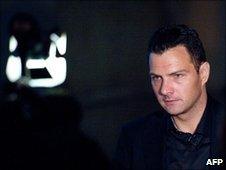SocGen trader Kerviel slammed for 'stratospheric' risks
- Published

Mr Kerviel has always maintained the bank knew about the risky deals
Alleged Societe Generale "rogue trader" Jerome Kerviel took "stratospheric" risks that almost brought down the bank, an ex-colleague told a court.
Mr Kerviel, 33, is blamed for losses of 4.9bn euros (then worth £4.3bn).
He has been under investigation since SocGen unveiled the losses in 2008, which it said were caused by unauthorised deals carried out by him.
On trial in Paris, he denies accusations of forgery, breach of trust and unauthorised computer use.
'Disappointed'
Salim Nemouchi, who worked on the SocGen trading desks, said Mr Kerviel "put in danger" the bank by making trades "for stratospheric amounts".
"I can't explain his actions. I am disappointed by his behaviour," Mr Nemouchi said. "All traders have limits they must respect."
Mr Kerviel has always maintained the bank knew about the risky deals, but turned a blind eye to them.
He admitted frequently passing trading limits and logging fake transactions to cover his gambles.
Mr Nemouchi told the court he was not aware such practices were common - causing Mr Kerviel to interject, saying: "I am very surprised. It was obvious."
'Not Robin Hood'
The trial in Paris is expected to last three weeks. Mr Kerviel could face five years in prison as well as a fine of 375,000 euros if convicted.
SocGen is also expected to submit a symbolic claim against its former employee for the recovery of the full 4.9bn euros that his trading position cost them.
The revelation about the unauthorised deals shook the financial markets, but was soon overtaken by the global sub-prime mortgage crisis, the collapse of Lehman Brothers and Bernard Madoff's Ponzi scheme.
SocGen was fined 4m euros by the French regulator for weaknesses in its internal controls and has since spent about 130m euros on tightening its systems.
Mr Kerviel's lawyer, Olivier Metzner, is expected to argue that high-risk trades at SocGen were normal and that his client's managers knew what he was doing.
He may also claim that the bank decided to turn against Mr Kerviel in order to divert attention away from SocGen's large losses in the US sub-prime mortgage market.
Societe Generale's lawyer, Jean Veil, has accused Mr Kerviel of "duplicity" for reassuring his bosses that nothing was wrong.
On Wednesday, Mr Kerviel's former boss had told the court the accused was "not Robin Hood".
"Jerome Kerviel is the trader who lost the largest amount of money in the world," Jean-Pierre Mustier said, who also turned on the accused for lying to him.
The police investigation into Mr Kerviel concluded early on that he had not personally profited from his activities and had not committed fraud.
- Published8 June 2010
- Published5 May 2010